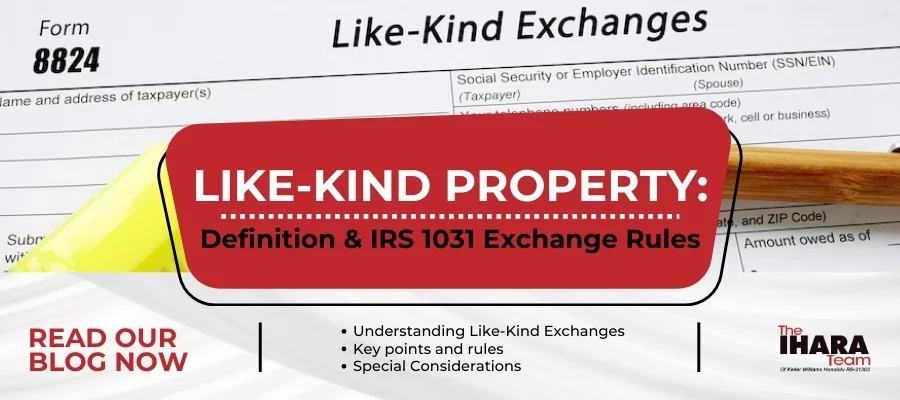What Is a Like-Kind Property?
A like-kind property encompasses two real estate assets that share a similar nature, irrespective of their grade or quality, enabling an exchange without incurring tax liability. As per the Internal Revenue Code (IRC) Section 1031, such properties, held for investment, trade, or business purposes, qualify for a 1031 exchange. Hence, both properties involved must serve business or investment objectives, excluding personal residences from like-kind property designation.
A 1031 exchange allows taxpayers to defer capital gains taxes on the sale of certain types of property if they reinvest the proceeds into another property of like-kind. This provision is outlined in Section 1031 of the Internal Revenue Code.

Understanding Like-Kind Exchanges
Individuals or businesses holding eligible business or investment properties can engage in a like-kind exchange, also known as a tax-deferred or 1031 exchange, as outlined in Section 1031 of the U.S. tax code, allowing the seller to defer capital gains on the transaction. The properties involved must meet the criteria set forth by the Internal Revenue Service (IRS) to qualify for such a transfer.
To qualify for tax deferral, like-kind properties cannot be sold outright; instead, they must be exchanged. Additionally, the like-kind property must be located within the United States. Therefore, a seller cannot utilize proceeds from selling a U.S. hotel to purchase one in Dubai and expect to defer capital gains.
Certain financial assets such as securities, stocks, bonds, and partnership interests do not qualify as like-kind property.
Like-kind exchanges can take various forms. A simultaneous exchange involves exchanging the two properties on the same day. Alternatively, a deferred exchange allows a party 180 days to finalize the exchange after the initial transaction. For instance, if an investor sells farmland, they have 45 days to identify a replacement property. The purchase of the like-kind property must be completed within 180 days of the farmland sale or by the due date for the tax return for that year. The IRS may grant an extension on taxes to accommodate the completion of the like-kind exchange before filing.
There’s a common misconception that like-kind properties must match in size or type to qualify, but that’s inaccurate—differing assets can be exchanged as long as they meet the criteria. However, primary or principal residences, primarily used for personal purposes, do not qualify for exchange. Properties eligible for exchange must be held for business or investment purposes. Here are several examples of potential like-kind property exchanges:
– Exchanging a multifamily property for an industrial building
– Swapping vacant land for a medical complex
– Trading an apartment building for a shopping center
– Exchanging a hotel for a retail property
– Swapping a condominium rental for a single-family rental
Here are some key points and rules regarding like-kind property and 1031 exchanges:
1. Definition of Like-Kind Property: Like-kind property refers to property that is similar in nature or character, regardless of its quality or grade. For example, real estate held for investment or business purposes can generally be exchanged for other real estate held for investment or business purposes.
2. Types of Property Eligible for Like-Kind Exchanges: While real estate is the most common type of property involved in 1031 exchanges, other types of property can also qualify, including equipment, machinery, vehicles, and certain types of personal property used in a trade or business.
3. Strict Requirements: The IRS imposes strict requirements on 1031 exchanges. Both the property being sold (the relinquished property) and the property being acquired (the replacement property) must be held for productive use in a trade or business or for investment purposes. Additionally, the properties must be of like-kind.
4. Identification and Timing Rules: Taxpayers must identify potential replacement properties within 45 days of selling the relinquished property and must complete the exchange by acquiring the replacement property within 180 days of the sale of the relinquished property.
5. Qualified Intermediary: To facilitate a 1031 exchange, taxpayers typically work with a qualified intermediary who helps ensure that the exchange meets IRS requirements and handles the transfer of funds between the sale of the relinquished property and the purchase of the replacement property.
6. Tax Deferral, Not Tax Exclusion: It’s important to note that a 1031 exchange allows for the deferral of capital gains taxes, not their exclusion. Taxes are deferred until a future date when the replacement property is sold without being exchanged.
7. Consultation with Tax Professionals: Given the complexity of 1031 exchanges and the potential tax implications, taxpayers considering a like-kind exchange should consult with tax professionals, such as accountants or tax attorneys, to ensure compliance with IRS rules and regulations.
These rules and guidelines help ensure that like-kind exchanges are conducted appropriately and in accordance with IRS regulations.
Special Considerations
While the like-kind property exchange remains applicable to real estate transactions, changes to the tax code have narrowed its scope in other areas. Previously, this exchange was utilized for assets ranging from cars to art to cryptocurrency holdings.
Navigating the 1031 exchange process can be intricate, and errors can be costly. Therefore, it might be beneficial to engage with a reputable, comprehensive 1031 exchange company. Typically, these firms offer cost-effective solutions compared to hourly attorney fees due to their efficiency, providing peace of mind through their expertise in managing such transactions.
The Tax Cuts and Jobs Act (TCJA) enacted in December 2017 restricted the exchange to only real estate held for business, trade, or investment purposes.
There’s ongoing debate regarding why real estate enjoys preferential tax treatment while other investments, such as machinery and equipment, are subject to capital gains taxes on every sale regardless of reinvestment. Nonetheless, as of 2021, the like-kind property exchange remains a viable method for accumulating tax-deferred wealth in real estate.


Leave a Reply